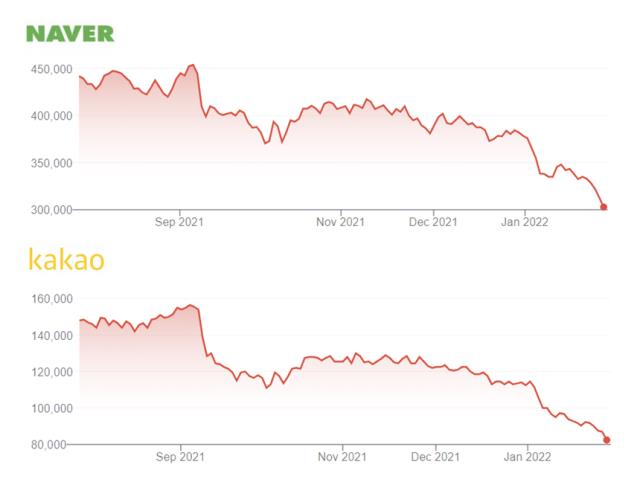Falling shares in Korean big techs affect employee compensation Naver and Kakao’s share-based compensation becomes less attractive as shares plunge
Translated by Ryu Ho-joung 공개 2022-01-28 08:10:43
이 기사는 2022년 01월 28일 08시09분 thebell에 표출된 기사입니다
Share-based compensation awarded by Naver and Kakao Corp to their employees has become less attractive to retain talent as shares in the two South Korean tech giants have significantly underperformed the market so far this year.The nation’s benchmark Kospi ended at a 14-month low on Thursday, down more than 12% compared to the beginning of the year, as concerns are growing about surging inflation and investors prepared for the possibility of the US Federal Reserve being more hawkish than expected.
Shares in Naver and Kakao closed at 303,000 won ($251.66) and 82,600 won respectively on the same day, tumbling 19% and 28% so far this year.

Falling shares in the two tech giants has a direct impact on compensation for their employees because both companies use share-based compensation, such as stock options and stock grants, to prevent talent drain.
Naver has awarded each employee annual stock options worth 10 million won since 2019. It also announced the disposal of 89,191 treasury shares earlier this month to give stock grants to its staff.
The exercise prices of stock options awarded Naver employees in 2019 and 2020 range between 120,000 won and 180,000 won per share, which are still profitable.
However, stock options granted in 2021 can be exercised at above 360,000 won per share, higher than the current market price, although Naver shares could recover and continue to climb until a vesting period ends in 2023-2024.
Kakao granted 443,800 stock options to 2,355 employees in May 2021. Those stock options can be exercised at 114,040 won per share, more than 27% higher than the current market price.
Kakao employees become 50% vested after two years of service and 100% vested after three years. This means stock options would be profitable for them only if Kakao shares rise more than 30% for the remaining vesting period.
A sharp decline in Kakao shares in recent months was in part due to company-specific reasons. Kakao Mobility, a subsidiary of Kakao, was at the center of the controversy last fall after it announced fee hikes, resulting in criticism over the broader Kakao Group.
Kakao’s public image was also hit hard by some of Kakao Pay’s executives who sold a large chunk of their shares shortly after the company’s stock market debut in November, causing a slump in the stock price and sparking shareholder anger. (Reporting by Seul-gi Kim)
< 저작권자 ⓒ 자본시장 미디어 'thebell', 무단 전재, 재배포 및 AI학습 이용 금지 >
관련기사
best clicks
최신뉴스 in 전체기사
-
- [Market Watch]DN솔루션즈 이어 롯데글로벌까지, 대형 IPO '휘청'
- [롯데글로벌로지스 IPO]흥행 실패 우려, 결국 상장 철회로 귀결
- [AACR 2025]제이인츠 'JIN-001', 독성 최소화한 '저농도' 효능 입증
- [Financial Index/SK그룹]주가상승률 50% 상회, SK스퀘어 'TSR' 그룹내 최고
- 금호타이어, 분기 '최대 매출'…영업이익은 '주춤'
- 유지한 SKC CFO "트럼프 관세, 위기보다 기회"
- [i-point]신테카바이오, 'K-BioX 글로벌 SUMMIT 6' 참여
- 간추려진 대명소노그룹 선택지, '티웨이'에 집중
- [감액배당 리포트]제주항공, 신속한 885억 감액…배당은 못했다
- [중간지주 배당수익 분석]세아베스틸지주, 배당수익 3배 급증...분할회사도 첫 기여






















